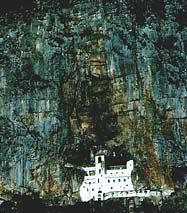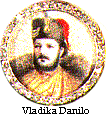
|
  The
MOC and its head have been a strong cohesive force of Montenegrin society,
shaping it and integrating together religious and secular consciousness.
Embodiment of the highest commandments and decisions was done by religious-moral
and customary-legal sanctions instead of a paid apparatus of coercion (D.
Zivkovic, 'Crnogorska Pravoslavna Crkva (XVI-XIX c.) feuilleton
Monitor
11/11/1991 p. 51). The
MOC and its head have been a strong cohesive force of Montenegrin society,
shaping it and integrating together religious and secular consciousness.
Embodiment of the highest commandments and decisions was done by religious-moral
and customary-legal sanctions instead of a paid apparatus of coercion (D.
Zivkovic, 'Crnogorska Pravoslavna Crkva (XVI-XIX c.) feuilleton
Monitor
11/11/1991 p. 51).
The use of religious-moral sanctions greatly contributed to achieving
internal balance of Montenegrin society, particularly at times when the
country was endangered by foreign forces. Thus, the church was entrusted
with "moral, political, and economic strengths to be the flagship of statehood
aspirations and to organize the liberation fight against the Ottomans"
(D. Zivkovic, 'Crnogorska Pravoslavna Crkva (XVI-XIX c.) feuilleton
Monitor
11/11/1991 p. 51).
  From
the religious and philosophical understanding of the world in which the
struggle for liberation and freedom is above everything else, the struggle
in which individuals and the society as a whole can prove themselves, the
new unique sociopolitical system, condensed in the notion "Vladikat', was
born. High moral purity, ability to govern, and devotion to serve the interests
of motherland and their people gave vladikas
the right to have the last word in everything. In times when vladika did
not possess any apparatus of coercion, he utilized mechanism of curse and
anathema which were highly effective (D. Zivkovic, 'Crnogorska Pravoslavna
Crkva (XVI-XIX c.) feuilleton Monitor 11/11/1991 p. 51). From
the religious and philosophical understanding of the world in which the
struggle for liberation and freedom is above everything else, the struggle
in which individuals and the society as a whole can prove themselves, the
new unique sociopolitical system, condensed in the notion "Vladikat', was
born. High moral purity, ability to govern, and devotion to serve the interests
of motherland and their people gave vladikas
the right to have the last word in everything. In times when vladika did
not possess any apparatus of coercion, he utilized mechanism of curse and
anathema which were highly effective (D. Zivkovic, 'Crnogorska Pravoslavna
Crkva (XVI-XIX c.) feuilleton Monitor 11/11/1991 p. 51).
  Sometimes,
it was claimed that vladikas had unlimited power at their disposal but
as Russian palace adviser Alexander Rojc noted referring to the power of
Petar I: "it could be called unlimited, but his power was naturally founded
on grace and unlimited trust, which was expressed in deep sorrow and sincere
mourning when he died" (quoted by D. Zivkovic, 'Crnogorska Pravoslavna
Crkva (XVI-XIX c.) feuilleton in Monitor 11/11/1991 p. 51). Sometimes,
it was claimed that vladikas had unlimited power at their disposal but
as Russian palace adviser Alexander Rojc noted referring to the power of
Petar I: "it could be called unlimited, but his power was naturally founded
on grace and unlimited trust, which was expressed in deep sorrow and sincere
mourning when he died" (quoted by D. Zivkovic, 'Crnogorska Pravoslavna
Crkva (XVI-XIX c.) feuilleton in Monitor 11/11/1991 p. 51).
  The
similar theme is reiterated by the renown historian Rovinski (Crna Gora
u proslosti i sadasnjosti, 1989, Cetinje, 352-3) "the Vladika was a
guardian of the people's spiritual strength and self-awareness, based on
faith and the tradition of heroism and glorious ancestors...the Vladikas
governed not by brute force but by purely moral influence, persuasion and
prayers. They all recognized the supreme authority of the Faith and the
Church in which the Vladikas and the people were one. It was a special
kind of spiritual brotherhood ". The
similar theme is reiterated by the renown historian Rovinski (Crna Gora
u proslosti i sadasnjosti, 1989, Cetinje, 352-3) "the Vladika was a
guardian of the people's spiritual strength and self-awareness, based on
faith and the tradition of heroism and glorious ancestors...the Vladikas
governed not by brute force but by purely moral influence, persuasion and
prayers. They all recognized the supreme authority of the Faith and the
Church in which the Vladikas and the people were one. It was a special
kind of spiritual brotherhood ".
 As
one of the components of the highest (dual) governmental authority, power
of the Montenegrin Metropolis, that is the MOC, has not had analogy in
the family of autocephalous Greek Orthodox churches where it belongs. Despite
the close relationship between the church and the state in all the countries
where the Eastern Orthodox religion is official, their sectors of jurisdiction
are clearly differentiated. This differentiation did not exist in Montenegro
since the same person headed both, the church and the state. Given that
both, the spiritual and secular powers, were embodied in one person, it
was natural that that the person had to be from the Montenegrin ethos.
In the word of Petar I "The
Vladika is an exemplary Montenegrin, as were the first Vladikas, and he
cannot be but a born Montenegrin from one of the best Montenegrin families".
It should be noted that Metropolis of Cetinje was the only eparchy in the
Balkans where a foreigner could not govern. As
one of the components of the highest (dual) governmental authority, power
of the Montenegrin Metropolis, that is the MOC, has not had analogy in
the family of autocephalous Greek Orthodox churches where it belongs. Despite
the close relationship between the church and the state in all the countries
where the Eastern Orthodox religion is official, their sectors of jurisdiction
are clearly differentiated. This differentiation did not exist in Montenegro
since the same person headed both, the church and the state. Given that
both, the spiritual and secular powers, were embodied in one person, it
was natural that that the person had to be from the Montenegrin ethos.
In the word of Petar I "The
Vladika is an exemplary Montenegrin, as were the first Vladikas, and he
cannot be but a born Montenegrin from one of the best Montenegrin families".
It should be noted that Metropolis of Cetinje was the only eparchy in the
Balkans where a foreigner could not govern.
The MOC economized its property very efficiently. If there was not
enough clergy to work the land, the land was rented to interested individuals.
Certainly, during the reign of the two last vladikas from the Petrovics'
dynasty, the Cetinje Metropolis was the biggest landowner in the country.
In this period, as well as before that, the land of the monasteries was
enlarged by gifts, purchases, and testaments, particularly by the right
on the land with no male left to inherit (pustos).
 On the first sight it appears that, using its privileges to enlarge its
property, the Cetinje Metropolis could easily become rich. It is true that,
particularly in the fruitful years, monastery barns, wine cellars, fish
smoking rooms, and other storerooms were full. However, bad crop years
were common and even catastrophic from time to time. In difficult times,
the Metropolis not only used its reserves to buy wheat and other necessities
to distribute to those in need, but since often this was not enough the
Metropolis also had to borrow in order to save a part of the population
from hunger and starvation. Thus, it could be said that all the property
of the Cetinje Metropolis during the vladikas (prince bishops) reign was
a public property in its true sense. According to D. Zivkovic (ibid.) "the
Cetinje Metropolis, during two and a half centuries of Montenegrin Vladikat,
ending with the time of Petar II,
has been a kind of people ministry for social welfare".
On the first sight it appears that, using its privileges to enlarge its
property, the Cetinje Metropolis could easily become rich. It is true that,
particularly in the fruitful years, monastery barns, wine cellars, fish
smoking rooms, and other storerooms were full. However, bad crop years
were common and even catastrophic from time to time. In difficult times,
the Metropolis not only used its reserves to buy wheat and other necessities
to distribute to those in need, but since often this was not enough the
Metropolis also had to borrow in order to save a part of the population
from hunger and starvation. Thus, it could be said that all the property
of the Cetinje Metropolis during the vladikas (prince bishops) reign was
a public property in its true sense. According to D. Zivkovic (ibid.) "the
Cetinje Metropolis, during two and a half centuries of Montenegrin Vladikat,
ending with the time of Petar II,
has been a kind of people ministry for social welfare".
See also official pages of Montenegrin Orthodox Church (MOC) |







 The
MOC and its head have been a strong cohesive force of Montenegrin society,
shaping it and integrating together religious and secular consciousness.
Embodiment of the highest commandments and decisions was done by religious-moral
and customary-legal sanctions instead of a paid apparatus of coercion (D.
Zivkovic, 'Crnogorska Pravoslavna Crkva (XVI-XIX c.) feuilleton
Monitor
11/11/1991 p. 51).
The
MOC and its head have been a strong cohesive force of Montenegrin society,
shaping it and integrating together religious and secular consciousness.
Embodiment of the highest commandments and decisions was done by religious-moral
and customary-legal sanctions instead of a paid apparatus of coercion (D.
Zivkovic, 'Crnogorska Pravoslavna Crkva (XVI-XIX c.) feuilleton
Monitor
11/11/1991 p. 51).
